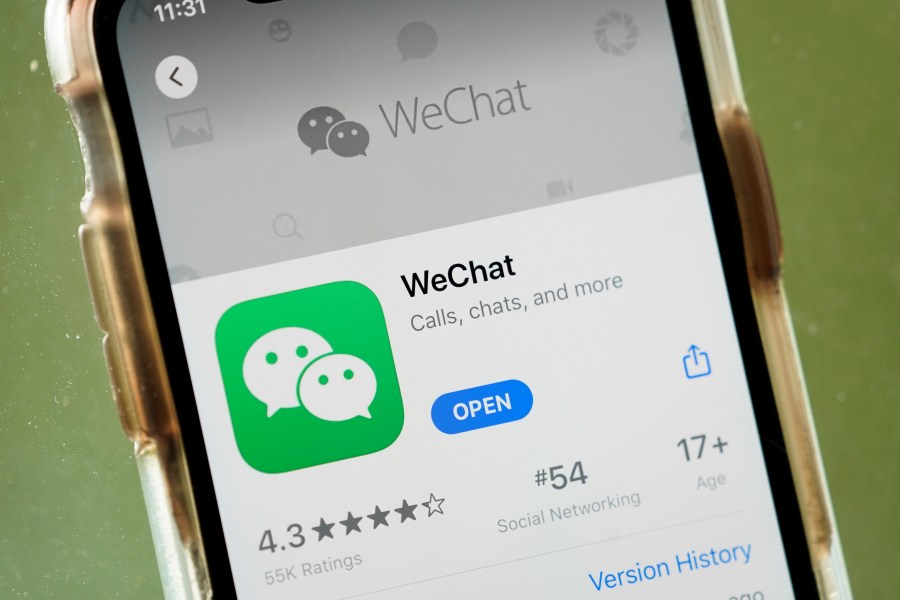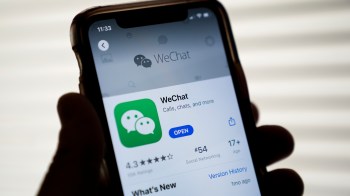Don’t lose sight of the proposed WeChat ban

President Donald Trump’s proposed ban on TikTok and WeChat could go into effect later this month. The administration says the apps expose American user data to China’s government, a possible national security threat.
With WeChat, there is real concern about surveillance and censorship. But the app is indispensable for communication between people outside China and those inside the country. And it is equally essential for American businesses who want to reach Chinese customers.
I talked to Jennifer Pak, Marketplace’s correspondent in Shanghai, about the vital role WeChat plays in China. The following is an edited transcript of our conversation.

Jennifer Pak: If I could give you an analogy, it would be like if somebody said you couldn’t use Facebook, Twitter, Amazon, Venmo, Zoom and Google all at once. It’s so vital for two key reasons. One is it’s a communication tool. But more importantly, it’s a marketing tool for businesses to reach potential Chinese consumers. The second and more important point about WeChat is that it has its own payment tool, WeChat Pay. And with this, you can open WeChat shops, which a lot of smaller brands do. So, it’s really no wonder that the American Chamber of Commerce in Shanghai had done a quick survey recently and found that 88% of respondents said banning WeChat entirely is going to be really bad for their competitiveness and revenues.
Molly Wood: It sounds like there are a couple things at play here. One is literally the ability to do business on WeChat. But the messaging part is a really big deal, too, because there aren’t a lot of easy pathways for communication between the United States and China.
Pak: Exactly. There is no substitute. I mean, right now, if you were to try to reach somebody in China, it’s usually through WeChat. People don’t even call each other on their lines. It’s a WeChat call. So if American businesses are completely locked out, maybe they have to find an intermediary.
Wood: Do you have a sense of whether American companies or Chinese companies might be pushing back on the Trump administration about this ban?
Pak: There already is a group that has been petitioning the Trump administration to at least show what’s the basis for this ban. The Trump administration has cited national security reasons, and certainly WeChat does censor. There have been people who have sent links [to articles the ruling part doesn’t like], and then the police calls them or they show up at their door. And obviously, WeChat as a communication tool also means that Chinese officials can use it to intimidate dissidents overseas in the U.S., for example, or also those with family members in China. But at the same time, because it’s such a crucial link between the China and U.S. business markets, and also the consumer base here in China, there’s obviously going to be pushback. We just don’t know how successful it’s going to be.
Wood: Is there a sense that some American companies could suffer more than others?
Pak: For sure. What’s been laid out so far is that there are best-case scenarios and worst-case scenarios. So the first one is a partial ban. And that might mean Apple and Google just have to remove WeChat from their U.S. app stores, which still leaves a little bit of room for people in the U.S. to bypass or find creative way to get WeChat, sort of like the way we get U.S. apps that are banned here in China. The worst-case scenario is a total ban, meaning Apple and Google have to remove their apps from their app stores worldwide. That includes China. So this is less of a worry for Google. Because Google’s app store doesn’t exist in China, it’s banned. But for Apple, it would be devastating because what’s the point of people in China buying an iPhone if they can’t use WeChat? And as you said, of course, people use it as a communication tool, not only to reach customers, but also for their staff. We send documents to each other, photos, video all the time. It’s really a very handy tool because it’s all in one.
Related links: More insight from Molly Wood
The New York Times has a piece from earlier this month on WeChat and how it extends Chinese censorship around the world. Including to the diaspora of people who live outside China and use it to communicate with friends and relatives back home. The article has a story about a Chinese citizen who had moved to Canada and discovered a world of news outside WeChat that didn’t match what was happening on the app. When she moved back home and shared some of that news, she was arrested and interrogated.
And unlike TikTok, which parent company ByteDance spun off as a standalone app that only operates outside China, WeChat’s management, servers and accounts are maintained in China. And people who live in China have censored and monitored WeChat accounts that stay that way even if they leave the country, according to the Times piece.
The app has been used to help round up members of China’s Muslim minority, the Uighurs, and monitor their families. It is a tool of censorship and surveillance, and it probably should be considered a national security threat if U.S. companies are on it and conducting sensitive business or even uploading personal details. And yet it is, by every measure, ubiquitous. The next few weeks will be interesting indeed.
As for TikTok, negotiations are ongoing.
The future of this podcast starts with you.
Every day, the “Marketplace Tech” team demystifies the digital economy with stories that explore more than just Big Tech. We’re committed to covering topics that matter to you and the world around us, diving deep into how technology intersects with climate change, inequity, and disinformation.
As part of a nonprofit newsroom, we’re counting on listeners like you to keep this public service paywall-free and available to all.
Support “Marketplace Tech” in any amount today and become a partner in our mission.

















